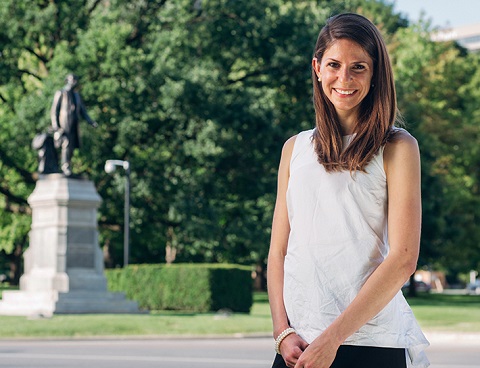It’s been 10 years since comedian Stephen Colbert first riffed on “truthiness” on his satirical television show The Colbert Report. The overwhelmingly popular witticism underscores a complex and often confusing phenomenon: in politics, “truth” often “comes from the gut” and not from facts. The truthiness trend, and the way ideology and spin have become seamlessly embedded in all political communications, troubles many political observers. But two U of T grads are doing something about it.
Dana Wagner (MGA 2012) and Tyler Sommers (BA 2010 Trinity) co-founded the non-partisan FactsCan.ca with friend Jacob Schroeder. Their mission is simple: to create a site that will help Canadian voters decipher complex political claims and separate facts from falsehoods during the current federal election campaign.
“Most Canadians don’t have the time to dig through complex policy documents before they cast their ballot,” says Sommers, who works full time in Ottawa with Aboriginal Affairs and Northern Development Canada. “Because there is little disincentive for politicians to lie and spin, some will continue to do it.”
That realization has led to a rise in fact-checking organizations: Duke University recently found 64 active fact-checking websites spread across six continents. FactsCan.ca, however, is the first dedicated organization of its kind in Canada.
“There is something inherently appealing about fact-checking and the finding of inaccuracies,” says Wagner, a journalism graduate who now works as a policy researcher at Ryerson University. “There is this beauty in distilling complex information to a very distinct point. It’s surprising just how much is cherry-picked or totally taken out of context.”
Modelled largely on the U.S.-based site PolitiFact.com, FactsCan.ca examines statements made by politicians on everything from defence to immigration to health. The team tries to include claims that are “significant, interesting and/or new to the public,” says Wagner.
Each claim is thoroughly researched and written up in a quasi-legal style that includes links and sources. Requests for clarification are sent to politicians to ensure pinpoint accuracy. Team members collaborate on giving each claim a score: “true,” “false,” “misleading,” “farcical,” or (once, when data about the Canadian Security Intelligence Service wasn’t available) “withholding judgment.”
For example, Conservative MP Pierre Poilievre earned a “farcical” for claiming a Liberal plan would take away every benefit the current government has delivered for families. In fact, the three programs introduced by the Conservatives would be kept or replaced with similar programs, meaning “at least three benefits” would not be cut, says FactsCan.ca. “Poilievre’s claim runs contrary to all available information.”
As a non-partisan group, FactsCan.ca analyzes politicians of all ideological stripes, and is careful to ensure balanced coverage of the Conservatives, Greens, Liberals and NDP. “Our currency is being bias-free,” says Wagner. “It’s the only way people are going to take seriously what we are reporting.”
It’s been tough, Wagner admits, trying to go from a standing start to full speed in less than a year before the 2015 campaign. The group formed in December 2014, and, in February, crowdfunded $8,300 to pay incorporation fees and build the website. But the staff of 15 are still unpaid for their work. Wagner admits that a different business model will be necessary to help them stay afloat in the future. For now, truth is the pressing task.
“Voting isn’t just about casting a ballot,” says Sommers. “It is about having your say in the future of your country. Most voters aren’t getting the kind of information they need to make an educated choice without all the spin.”
Recent Posts
U of T’s 197th Birthday Quiz
Test your knowledge of all things U of T in honour of the university’s 197th anniversary on March 15!
Are Cold Plunges Good for You?
Research suggests they are, in three ways
Work Has Changed. So Have the Qualities of Good Leadership
Rapid shifts in everything from technology to employee expectations are pressuring leaders to constantly adapt






2 Responses to “ Standing for Truth ”
If this organization is non-partisan, why is the only example given one that is critical of a Conservative politician? Doesn't look very non-partisan to me.
Thanks for your comment. This story was written for the print magazine, and so space was limited to one example. We included the only example (at press time) of a “farcical” rating.